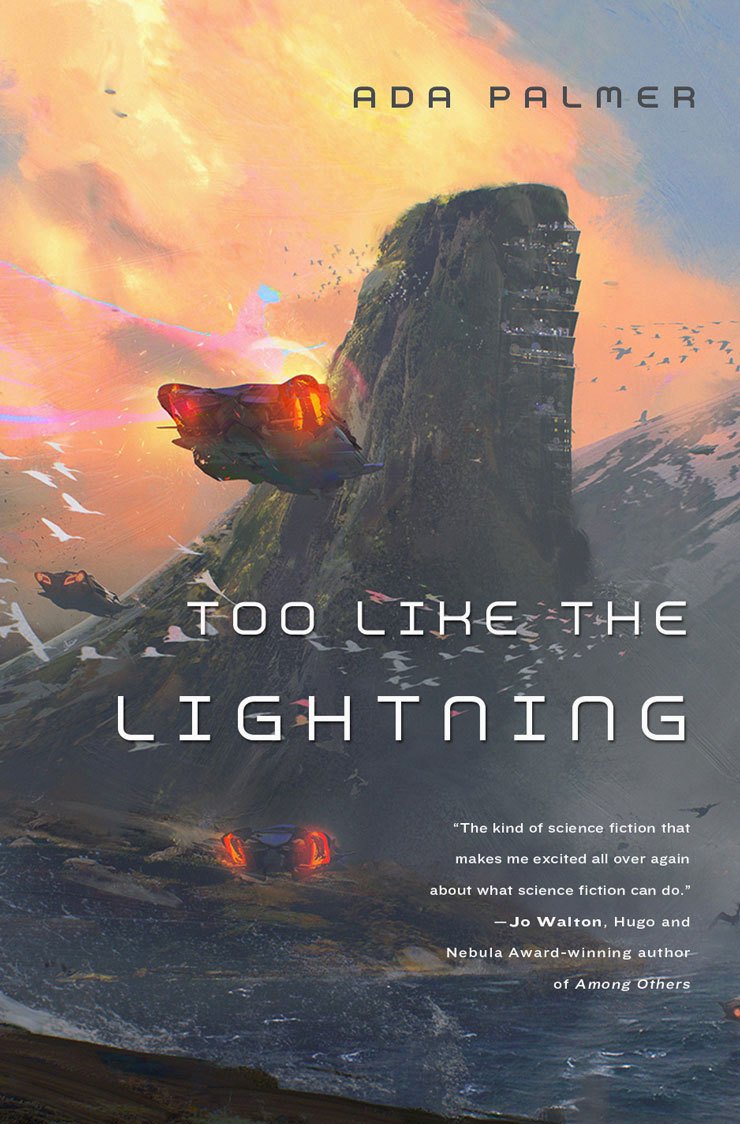M@ reviewed Too Like the Lightning by Ada Palmer (Terra Ignota -- Book 1)
Review of 'Too Like the Lightning' on 'Goodreads'
3 stars
This book has some truly spectacular world-building, all proceeding from perhaps the most fundamental element of science fiction: flying cars. How would society change if we had flying cars? The author sat down and built from there, and I think they did really intriguing work.
I've seen other reviewers complain about the stylistic choices that the author made. This has a very distinctive voice that attempts to evoke 18th-century styles, like constantly rapping on the fourth wall for side conversations. It didn't really bother me. In the straight prose, the author's really quite talented:
If you cannot imagine numbers have such power to move a man, imagine instead one of his historical counterparts: you are the tutor who has sensed something strange about this youth Caligula; you are the native who sees a second set of white sails on the horizon following the first; you are the hound who feels the tremors of the tsunami about to crash on Crete and erase the Minoan people, but you know no one will heed you, even if you bark.
You write a sentence like that, you could run it up pretty much any stylistic flagpole and I'll salute.
The author is quite enamored of [a:Alfred Bester|10992|Alfred Bester|https://images.gr-assets.com/authors/1418852724p2/10992.jpg] and his masterwork, [b:The Stars My Destination|333867|The Stars My Destination|Alfred Bester|https://images.gr-assets.com/books/1433671750s/333867.jpg|1398442]. They get a shout-out both in a character's name and in the acknowledgements section. That's a perfectly good idol to have, and a perfectly good book to emulate, but my big complaint about Too Like the Lightning is that it emulates the worst part of The Stars My Destination: to wit, every character is a really important polymath/paragon, every story line is potentially world-shaking, and the characters are constantly zipping around the world (in their flying cars!) having epic struggles.
For example, our narrator, Mycroft Canner (the world's most notorious serial killer -- strike one) is hanging out with a magical child with mysterious powers (strike two). As punishment for the serial killing thing, which bothers exactly one character for two scenes, he is sentenced to travel the world "helping" people. The first household where he's performing the service is the six- or seven-person family business that completely manages the entire world's fleet of flying cars (strike three). One of the family members is a world-famous athlete, raconteur, and gunslinger who is used as a model for dolls (strike four), one is an Oscar-winning smellographer (strike five). He's called from there by the Imperial Censor (strike five) to compute some mathematical fallout from a plot element, because he's a world-class mathematical analyst (strike six). From there, we meet the leaders of every faction in the world, essentially voluntary nations (this is an awesome idea, very well-executed in the text), who are all on a first-name basis with our narrator (strike seven).
Now, this happens a lot in scifi, notably in The Stars... and many other rather famous works. And it's relatively easy to get past, because I was interested in the story and the world enough to put up with the narrator's knack for being in exactly the right place at exactly the right moment to get the next clue, maguffin, or character. And remember, I'm giving this thing three stars, so clearly it wasn't enough to throw me off.
Basically, I'd say give it three chapters. If the style doesn't turn you off and the collection of ubermensch characters don't alienate you, you might very well dig it. I'm looking forward to the sequel, not least of which because this book comes to an incredibly abrupt ending and resolves almost nothing.

